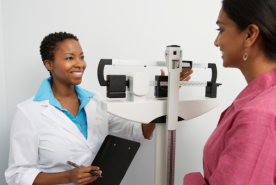For many patients who are on dialysis or have had a kidney transplant, the ability to travel is important to their self-esteem and lifestyle. Working patients may need to attend business meetings or conferences. Older patients may have dreamed of traveling during their retirement. A family event such as a wedding, graduation or family reunion may require travel away from home. At times, emergencies such as illness or a death in the family may require travel.
Is it possible for kidney patients to travel?
Yes, most patients who receive dialysis or have had a kidney transplant can travel safely and continue their treatment while away from home. Of course, you should always consult your doctor before planning to travel. Most doctors encourage travel if the patient's health is stable. Traveling can give a big boost to a patient's morale and sense of well-being.
How should hemodialysis patients begin to plan a trip?
Many dialysis centers have a staff member who is experienced in arranging dialysis treatments away from home (transient dialysis). Some centers will assist patients in making their own arrangements. Ask your social worker or primary nurse if there is such a person at your center.
It is important to start planning at least six to eight weeks in advance. More time should be allowed for popular vacation spots or travel during holidays. Be flexible about the dates for your trip as space in dialysis units may be limited. If you would prefer to have your treatments on specific days and at specific times, let the center know in advance. The unit may not always be able to honor your request, however, because space is limited.
You or your patient travel coordinator may need to contact more than one center in order to find a center that can provide dialysis for you. Check with the center as soon as you arrive to confirm your appointment. You may also want to visit the center and meet the staff so you will feel more comfortable. Before doing this, however, make an appointment with the social worker or nurse manager of the dialysis center you plan to visit.
How will I find a center to dialyze at?
If you plan to visit friends or family out of town, they may be able to give you the name and address of the dialysis center nearest them. Resource publications are available at your center listing dialysis centers around the world that are willing to accept transient dialysis patients. Your social worker or the patient travel coordinator at your center will be able to assist you.
What information will my transient dialysis center need to safely provide dialysis for me?
Most dialysis centers require the following information in order to assess your health and plan for your treatments with them:
- the dates you need dialysis treatment
- your name, address, etc.
- medical history and recent physical exam reports
- recent lab results
- recent EKG
- recent chest x-ray
- your dialysis prescription and 3 to 5 recent treatment records
- dialysis access type
- special needs or dialysis requirements
- information about your general health
- insurance information
- where you will be staying in the area
- a list of the medications you take during treatment and at home.
This information will be sent to your destination center for review. It is important for the doctor and transient center to know as much about you as possible in order to care for your needs while visiting their center. In addition to mailing your records to the center, you should hand carry a copy with you.
How can I be sure about the quality of care I will be getting away from my regular center?
You may want to ask the following questions when making your arrangements for hemodialysis during your trip:
- Does the center reuse dialyzers?
- Does the center reuse bloodlines?
- What is the average treatment length of dialysis at the center?
- Can they provide the treatment time your doctor has prescribed?
- What are the hours and days of operation? Traveling patients often are placed on an evening shift, which could end as early as 7:30 p.m. or as late as 2:00 a.m.
- What types of dialyzers are used?
- Can you use the same type of dialyzer you use at your home center?
- What types of dialysis machine does the center have (conventional, high flux capability)?
- Does the center routinely provide lidocaine?
- Are patients permitted to eat or drink while on dialysis?
- Is an ice machine available for patients?
- Is public transportation available to get to the center?
- How many patients are assigned to each nurse or patient care technician?
- Can you get all the medications you get at your home center during dialysis?
What if I get sick while I am visiting another center?
Don't overdo it! Be realistic when planning activities. Allow enough time to enjoy sightseeing outings and activities without becoming overtired. Also, be sure to watch your diet and fluid intake. Before you begin your trip, you will most likely have a doctor assigned to you by your transient dialysis center. Find out how to contact the doctor when you first arrive. If you do become ill, call the dialysis center or doctor as instructed.
It is possible that a transient patient may require hospitalization. If this should happen to you, your transient doctor is prepared for this possibility and will care for you during your hospital stay. He or she will probably talk to your regular doctor to coordinate your care. You may feel more comfortable to know if this coordination has taken place. Being hospitalized while away from home can be a stressful experience for any patient, and it certainly can change your travel plans. Preparing ahead for this possibility can help make the experience less stressful. The following suggestions may be helpful:
- Make sure your family knows your travel plans.
- Make sure you have important phone numbers with such names as your regular doctor, dialysis center, etc. Have a copy of your medical records with you while traveling.
- Make sure anyone who is traveling with you knows where you keep your records and what your medical needs are.
- Make sure to bring enough of the medications you need to take to last for the entire trip, with enough extra to deal with possible emergencies such as lost luggage or a spill. Also carry written prescriptions just in case.
Is home hemodialysis possible on a trip?
Yes, although most home hemodialysis patients make arrangements for in-center treatments while traveling. Patients who wish to continue doing their own treatment while traveling should check with their dialysis care team about whether they can do home dialysis away from home. Some patients travel with their machines, supplies and portable water treatment equipment. An example would be people who have dialyzed in campsites equipped with hook-ups for electricity.
Even if you do your own treatment, it is important to know where the closest dialysis center is where you could go for assistance. Let the center know when you will be in the area, and ask if they would be willing to provide medical assistance if needed. Carry complete medical information with you. Remember that most dialysis and equipment companies have toll-free numbers for assistance 24 hours a day. Carry these numbers with you.
What should peritoneal dialysis patients know about traveling?
Traveling is often easier for peritoneal dialysis patients because they are not dependent on the availability of a dialysis unit. Peritoneal dialysis patients still need to plan ahead and arrange for back-up medical care for their trips, as do hemodialysis patients. Typically, this would mean contacting a dialysis center in the area where you will be and asking if they would be available should a problem arise. The center may request a copy of your medical records in advance. In any case, you should always carry a copy of your records with you as well.
CAPD patients should carry enough supplies for the length of the trip, plus some extra supplies in case of problems. It may also be possible to arrange for delivery of supplies to your destination for longer stays. Make sure these supplies have arrived before you leave on your trip. CAPD patients also need to plan for adequate clean space where they may do their exchanges while traveling.
APD patients who plan to travel for one week or longer can arrange for supplies to be delivered to their destination. Smaller cycler machines are now available, which are easy to carry on airplanes and to use in hotel rooms, campers, etc.
Is it possible to travel if you are active on a transplant waiting list?
Yes. Simply inform your transplant coordinator about your travel plans. The coordinator will help you decide whether to be "on hold" during the trip or whether you would be able to return within a reasonable amount of time if a kidney became available. Arrange to be contacted in the event a kidney becomes available.
What should diabetic patients know about traveling?
Since the unexpected may happen during a trip and meals may be delayed, you should carry glucose tablets and appropriate snacks, such as low-potassium juice boxes or hard candy, to treat low blood sugar. It's a good idea to travel with a "brown-bag" lunch or a packaged nutritional supplement in case of delays. Managing your diabetes can be made simpler by having insulin, syringes and blood glucose monitoring supplies handy.
Will my insurance cover treatment during travel?
If Medicare is your primary insurance coverage, Medicare will pay for 80 percent of your treatment costs within the U.S. and its territories. You will be responsible for the remaining 20 percent not covered by Medicare. If you have secondary insurance, it may cover this 20 percent. However, you may have to pay this 20 percent "up front" and bill your insurance later. Check with the transient center about their policy on this. Most state Medicaid programs will not pay for treatment outside of your home state.
If you have commercial insurance as your primary insurance, you may need to request a letter from your insurance company stating they will pay for your treatment at the transient dialysis center. Some commercial insurance will pay for dialysis outside of the U.S. Transient dialysis centers will often call and verify this coverage themselves. Be sure to allow enough planning time to make these arrangements.
A doctor's fee may also be charged by the transient dialysis center. Be sure to ask what portion of this charge will be your responsibility.
Further information
Where can I get more information?
Following is a list of other resources you may find helpful:
- Easy Access to National Parks, by Sierra Club Books, available at bookstores or order from the Sierra Club at 1-800-935-1056.
- Management of Diabetes During Intercontinental Travel, available free from The Diabetic Traveler, P.O.. Box 8223 RW, Stamford, CT 06905; (203) 327-5832.
- "The List," a comprehensive list of international dialysis centers accepting transient patients. Available from Dialysis & Transplantation, 7628 Densmore Ave., Van Nuys, CA 91406-2088. (Most dialysis centers have a copy.)
- Also available are companies that specialize in vacation and travel planning for dialysis patients, such as cruises, foreign travel, and wilderness travel. Camps are available for dialysis and transplant patients (both adults and children). Contact your local National Kidney Foundation office for more information and a directory of camps. Your health care team can also give you more information about these options.
Don't forget!
- Hand carry essential medical information, your medicines and other medical supplies in case of the unexpected, such as lost luggage.
- Bring enough of your medications to last for your entire trip, with enough extra to deal with possible emergencies. Also carry written prescriptions just in case.
- If you need extra assistance boarding a plane or train, inform personnel when you check in so they can give you special instructions.
- If you are planning to travel by plane or train, make arrangements for any special meals such as low-salt, low-fat or diabetic, at the time you make your reservations.
- When making a hotel reservation, you can request a first-floor room or a handicapped-accessible room, if stairs or distances are a problem.
- If you use a travel agent, tell the agent about any special needs you may have, such as special meals, accessible rooms, and assistance while changing planes. The agent can also advise you about special considerations regarding safe transport of dialysis supplies while traveling to foreign countries.





